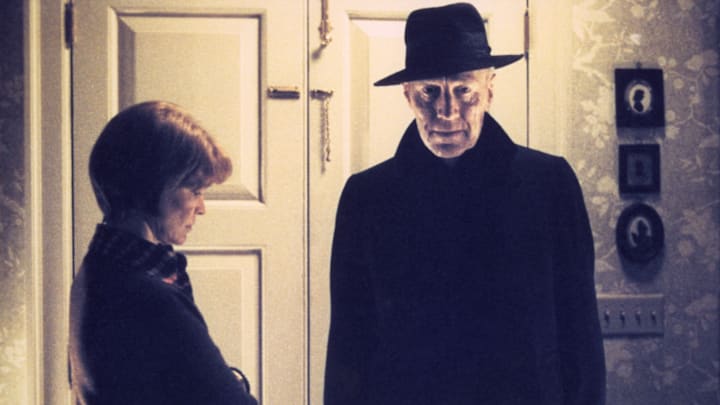Once upon a time, I was supposed to go on a weekend trip with friends while the rest of the family went to a cabin. We had to cancel at the last minute and my family decreed that I was okay to stay home alone for a coupe of days. That first night. alone in a haunted house, I found a movie on TV in which a woman asked a priest to help her daughter. I didn't realize it was The Exorcist until a few minutes later and I was too interested to shut off the TV. Understandably, I don't watch that movie often. I had nightmares for most of a week and I can vividly remember some of the more graphic parts. So why am I here, talking about The Exorcist? Because there are some books that I read over and over, but William Peter Blatty's The Exorcist is the only one that I feel like reading at least once a year.e
Basic Plot
A famous actress, Chris McNeil begins hearing strange noises in her house and her daughter's furniture seems to move of its own accord. After her daughter Regan begins acting out, she's referred to doctors and a psychiatrist. There doesn't seem to be anything wrong with Regan physically, but her personality. She's labeled as depressed or epileptic and eventually, one psychiatrist suggests that Regan might be helped by an outdated ritual known as exorcism. Chris seeks out Father Karras, a Jesuit priest who is also a psychiatrist, and he realizes after doing many tests and studying the case that Regan is possessed. He obtains permission to exorcise the demon with the help of a more experienced priest. At a great personal cost, Regan is liberated from the possession.
What the movie left out are a few subplots. We know that Karras' mother dies, but we don't see the way his guilt eats away at him and leads him to ask for reassignment to care for her before that. There is a scene depicting the desecrations of a church, but there is no indication that Regan is implicated in these things or that Karras has a vision of a man who blames him for the desecrations on the night before he applies to perform an exorcism. The detective investigating a murder puts together a great deal of evidence first against the Swiss housekeeper whose great secret turns out to be the support of his junkie daughter. Nothing removed from the plot makes it a bad movie, but it makes it less interesting.
Why I read it
I realized several years ago that this is a three-act formula about what we hold sacred, how the sacred is desecrated by forces beyond our control and the sacrifices we must make to restore the sacred. I've found this structure in other media from Star Wars to The Hobbit, but The Exorcist is the clearest example.
And I'm not just talking about religion. Sure, we have the Jesuit priests who literally save the day and Chris' secretary practices a form of Buddhism casually, but it is clear throughout the book that Chris doesn't believe in much of anything. Before Regan, she lost a son and it deeply impacted her personal belief in a higher power of any kind. Karras loses faith in what he feels is his calling, but when he contemplates what has caused him to do so, he recalls acts of human cruelty as well as arbitrary punishment of the innocent.
All of the characters have something that they don't see the same way at the end of the book. All of Chris' success and devotion to her daughter has not delivered her from evil. Regan believes she can trust the man she met through an ouija board. Willie and Karl, the housekeepers, are forced to act against the daughter who they had thought was dead. The restoration of the faith is as compelling as the plot of rescuing a 12-year-old girl from an ancient evil.
What is the best part for me, though, is that in the face of the impossible battles that each character fights, there is a divine certainty as the cornerstone and it makes this a book about the human capacity to believe again. Father Merrin,, the exorcist who has faced this demon before admits that "long ago I despaired of ever loving my neighbor" and relates how it tormented him as a man who yearned to serve his creator. The answer to this conundrum is that "God would never ask of me that which I know to be psychologically impossible; that the love which He asked was in my will."
All of this book's triumphs depend on the will and love of people fighting a losing war and that is something that all of us can not only relate to, but draw power from. This is a book about the deeply profane that can give us hope for our most flawed selves.
